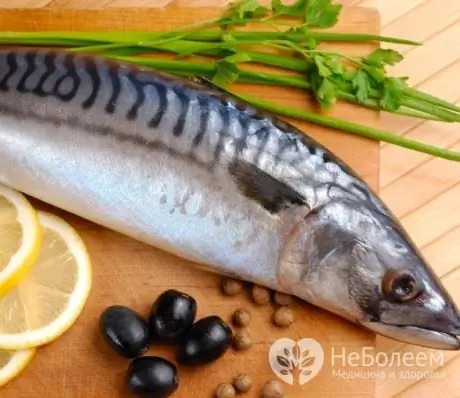Mackerel
Many people consider it too fatty fish, but an experienced chef will always happily take up the preparation of mackerel, because you can create a real miracle from it.
The ratio of BJU in the product

Source: depositphotos.com How to burn 191 kcal?
| Walking | 48 minutes |
| Jogging | 21 minutes |
| Swimming | 16 minutes |
| A bike | 27 minutes |
| Aerobics | 38 minutes |
| Household chores | 64 minutes |
Mackerel belongs to the Mackerel family of the genus Scomber. The rest of the species are outnumbered by the Atlantic mackerel, also called mackerel and belonging to the order of perchiformes. This fish is found in the Atlantic Ocean. It can be found along the east coast, from the Canary Islands to Iceland, as well as in the Marmara, Baltic, North and Mediterranean seas. On the west coast, fish are common from Cape Hatteras (North Carolina) to Labrador. During summer migrations, fish can be found on the southwestern coasts of Ireland and in the North Sea from the Skagerrak to the English Channel.
Another species of mackerel - Kuril or Japanese - lives from Eastern Argentina to Nova Scotia, as well as from the Sea of Japan and Northern Sakhalin to Australia. This fish is also widespread in the Indian Ocean, in the Persian and Aden Gulfs.
On average, mackerel is about 30 cm long, but sometimes giants are about 60 cm long. The fish has a fusiform body and small scales. The back is blue-green with numerous black stripes, slightly curved, no swim bladder.
Mackerel is a schooling heat-loving fish. For her, the optimal water temperature is 8-20 degrees Celsius, and she prefers to spend the winter along the slope of the continental shoal at a depth of 150 m. Mostly schools of mackerels are fish of the same size, and in the school you practically cannot find fish of another species.
Mackerel is a valuable commercial fish due to the fact that its meat is juicy and tender. Many people consider fresh mackerel to be too oily fish with a pungent smell, so they prefer to limit themselves to preserves and canned foods from it, or eat its smoked version. However, experienced chefs assure that cooking mackerel can be a real pleasure. For example, you can make delicious fish kebab from it. At the same time, there is no need to marinate the fish, just sprinkle it with lemon juice. In Italy, mackerel is often cooked “in a navy way” (fish is baked with lemon juice, bay leaves, pepper and capers). Cooking mackerel is also popular in Japan. There it is simply deep-fried in vinegar and soy sauce and served with vegetables.
Mackerel goes well with sour sauces such as gooseberry or cranberry. The acid slightly softens the oily taste of the fish, making it less sugary. Also mackerel is good with tomato, onion and white wine sauce.
Composition and calorie content of mackerel
Mackerel is a rather fatty fish. There are about 13-30 g of fat per 100 g of the product. Fish caught in winter in northern latitudes are especially fatty. Proteins in mackerel contain about 18 g per 100 g of product. These proteins belong to the category of rapidly digestible and are absorbed by the body almost three times faster than beef meat.
Despite the high fat content, the calorie content of mackerel is quite low and amounts to about 200 kcal. It turns out that in order to consume the daily calorie intake, a person will only need to eat 700 g of fish. Nevertheless, it will be quite problematic to do this, because it has already been said above that, despite the low calorie content, mackerel contains a lot of fat.
The undoubted advantage of mackerel is the unsaturated fatty acids included in its composition. They are a valuable product and play the role of antioxidants, that is, they help neutralize free radicals and strengthen cell membranes.
Radicals tend to pierce cell membranes, thereby disrupting their vital activity, which often leads to the emergence of various diseases, in particular cancer. Therefore, in order to prevent it, it is important for a person to consume valuable foods, including fish oil, which is rich in unsaturated fatty acids.
Also, the benefits of mackerel are a large amount of various minerals. It contains zinc, fluorine, phosphorus, sodium, sulfur, manganese, potassium - and this is far from all the useful substances that make up its meat. It also contains vitamins PP, A, C, B vitamins, including vitamin B12, which takes part in the metabolism of fats, promotes DNA synthesis, and during hypoxia increases the level of oxygen consumption by cells.
Benefits of mackerel
Thanks to its rich chemical composition, the benefits of mackerel for children are obvious. It is an irreplaceable fish for their harmonious and correct development. Fish will also be useful for pregnant and lactating women, as it promotes lactation. And for adolescents, this fish is a valuable product, since in adolescence it is often possible to observe an imbalance between the development of internal and external organs. Mackerel is able to smooth this process.

In addition, due to its high phosphorus content, mackerel is very beneficial for our musculoskeletal system.
The benefits of mackerel are also to normalize blood sugar levels, reduce carcinogenic substances in cells, increase immunity, prevent cardiovascular problems, regulate hormone levels, reduce blood pressure, strengthen the nervous system and memory, and normalize digestion. And unsaturated fatty acids are very beneficial for the human brain, especially the spinal cord, hair, skin and mucous membranes.
Contraindications
Boiled mackerel has practically no contraindications, but smoked or salted mackerel is contraindicated for people with heart diseases and gastrointestinal problems. Due to its high fat content, mackerel is contraindicated in people with chronic liver and kidney disease.
YouTube video related to the article:
Found a mistake in the text? Select it and press Ctrl + Enter.







